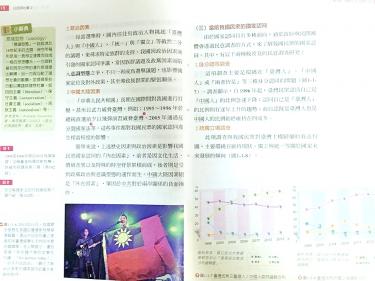Action Coalition of Civics Teachers spokesman Huang I-chung (黃益中) said the Ministry of Education’s changes to high-school curriculum guidelines allowed it to sneak in the desiccated corpse of party-state education of bygone days.
The dogma of the past might be making a comeback in some parts of new high-school civic education textbooks after its removal nine years ago, Huang said.
Changes in 2012 required textbooks to “define the concept of national identification and describe how Taiwanese hold different views on the issue of national identification in accordance with the Constitution,” which allowed textbooks to be more in tune with contemporary matters, Huang said, adding that there were differing ideas on national identification due to internal politico-historical factors and the China factor.
Textbooks introduced the idea that there are many facets of national identification, Huang said, adding that organizations often used identification and political stance as ways to gauge ideas of national identity.
However, the changes that went into effect last month demanded that textbooks follow “the spirit and guidelines behind the founding of the nation as represented in the Constitution,” Huang said.
Such demands will inevitably return textbooks to decades past, when everything was tied into the “three principles of the people,” he said.
“The three principles of the people forms the basis of the Republic of China to be a democratic republic of the people, by the people and for the people,” Huang said, quoting the first article of the Constitution.
Huang said some textbooks have already done so and removed materials that portray “divided views on national identity.”
Democratic Progressive Party (DPP) Legislator Cheng Li-chun (鄭麗君) said the nation was not truly relieved of party-state-dictated education until the implementation of the curriculum on Sept. 5, 2006.
The Chinese Nationalist Party (KMT) established courses specifically teaching the three principles of the people in high schools and vocational high schools since its relocation to Taiwan in 1949, Cheng said.
The implementation and exclusion of the three principles from textbooks is a symbolic representation of Taiwanese fighting for the “democratization of history,” Cheng said, adding that the return of the three principles meant a return of party-state meddling in education.
This is the primary reason the changes must be abolished, Cheng said.
Humanist Education Foundation executive director Joanna Feng (馮喬蘭) said the ministry was “raping Taiwanese education with outmoded autocratic curriculum material,” adding that weak efforts by the administration of President Ma Ying-jeou (馬英九) to “brainwash” students would only be met with disgust from young people.
Taichung official Yen Ching-hsiang (顏慶祥) said the new curriculum was anti-democratic in terms of its treatment of national identification.
It is a regression of education that flew completely in the face of social development and public will, the Bureau of Education director said.
National Academy of Educational Research secretary-general Wu Hsiao-hsia (武曉霞) said that while there were changes to portions outlining national identification, the running consensus of the review committee was that new textbooks should portray the founding spirit of the Constitution, adding however that publishers’ ways to describe that would be respected.
Source: Taipei Times - 2015/09/07





















